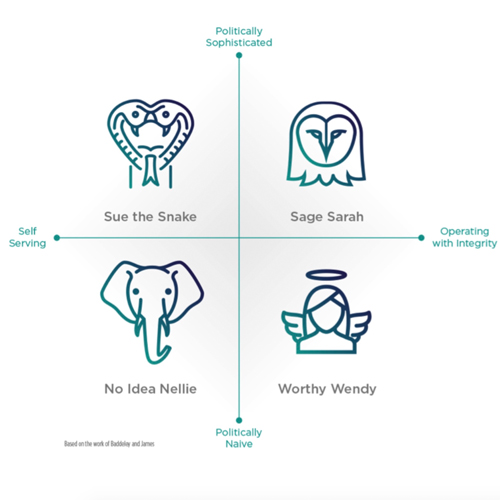Female leaders often tend to avoid organisational politics and this can limit their career progression. If we want more women to get ahead, they need to hone their political savvy skills, advises guest columnist Penny de Valk.
Many managers find organisational politics grubby and distasteful. Women managers/leaders particularly dislike it and so avoid organisational politics, which risks limiting their career progression.
So why do women generally have a greater aversion to organisational politics than men? Some of it is the conflict between our ‘gender’ roles and our ‘leader’ roles. According to one Harvard Business Review study, 81% of women and 66% of men said that women are judged more harshly than men when they are seen to be ‘engaging in corporate politics’.
This aversion to politics, however, can limit women’s progression into leadership positions, because the higher up the career ladder you go, the greater the need for influencing. That requires being politically savvy. Not building ‘political savvy’ capability and not seen to be exercising it, will stall any leadership career.
I am sure you have heard statements from many women, such as, ‘it goes against my values’; ‘my competence should speak for itself’; ‘politics is basically tacky and game-playing’; ‘politics is a manipulative waste of time and totally self-serving’. Yes, it can be, but it doesn’t have to be.
NEGATIVE MINDSET TRAP
I often see women and their careers get hijacked by a negative mindset about political skills. They’re working hard and doing a great job, committed to their career when someone, who they see as less able, gets promoted above them, or their brilliant plan is scuppered or owned by someone else.
Sideswipes like that are tough and confusing. They build resentment and feelings of unfairness and being an outsider. It’s the sort of experience that erodes women’s confidence, the very confidence they need to progress. However, to build pipelines of qualified female leaders who are able to progress, we need to equip them with political savvy skills.
The more senior women become, the more they need to get their heads up from what they are already good at, and start building and demonstrating new and additional competencies, which includes political savvy. After all, those who are politically savvy, have better career prospects and career trajectories. They are seen as more promotable and are less likely to have derailed careers, according to the Centre for Creative Leadership Research (2015).
POLITICAL SAVVY MATTERS
Political savvy is important because:
- It gets the team’s ‘big important stuff’ done.
- It gives authority.
- It builds credibility as others also want to see ‘women are able’ to do it.
- It builds trust as staff expect to be managed that way.
- It will build leadership reputation.
It doesn’t mean selling out. Selling yes, but the thing women are selling are their ideas and their value. If women want to be a change agent (and that’s what leaders are for), they need to influence. To be able to influence, they need to understand how decisions are made where they work. They need to really ‘get’ the sources of power in their organisation. Basically, they need to learn to read the people, the room, the culture and the system. Then choose, with skill, how to strategically influence people/teams.
BUILDING THE SKILL
So how and where do you start to build the skill of political savvy in your female potential? Operating with integrity and being politically sophisticated is not an either/or. Have a look at the following chart and plot where you and your colleagues might be on these axes.

We’ve all seen terrible political behaviour in organisations that has nothing to do with the interests of the organisation. When we observe that kind of behaviour, it can encourage a negative mindset about acquiring political skills. Yet political savvy (done well) should simply be about being strategic and ensuring women in your organisation are optimising their influence as a leader – and that can be done with integrity. If they want to, they can learn to operate as ‘Sage Sarah’ (top right quadrant of the chart above). They get to choose how, or if, they participate, on what basis and to what end. But being naïve to it is not an option for aspiring leaders. Everyone remains in charge of how and who they become. As for that self-serving snake (top left quadrant of the chart)? They don’t have to be that person either.
LEVERAGING RELATIONSHIP SKILLS
Don’t expect political savvy to come naturally. Leadership requires both men and women to be conscious of their behaviours and the impact our behaviour has on those around us. It confers a responsibility to be both self-aware and socially-aware. As Bonnie Marcus in her book The Politics of Promotion, says ‘social effectiveness is political savvy’. So, leveraging those relationship skills, particularly in leadership positions, is pivotal.
My advice: Whether it’s through a training course or mentoring/coaching, encourage your aspiring female leaders to develop their political savvy. Develop them to do it well with integrity, acknowledging they will struggle with stuff along the way, like everyone else. It’s tough getting to, and staying in, the top right quadrant of the chart, but it is a skill that can be developed. As long as women can keep reminding themselves of the value they bring and what they are trying to achieve, they can be both politically savvy and honourable. Ultimately, that is what leadership reputations are built on.
There are no silver bullets, but attending my 90-minute virtual workshop on Political Savvy for Women is a starting point. Click here for more details.

AUTHOR BIOG
Penny de Valk is an internationally experienced Chief Executive and qualified coach who helps women leaders build powerful professional lives. Check out her blog for great leadership advice.
Penny de Valk is offering a free place on her virtual Political Savvy for Women workshop for the first three fairplaytalks.com readers who get in touch with her on penny@pennydevalk.com.







































